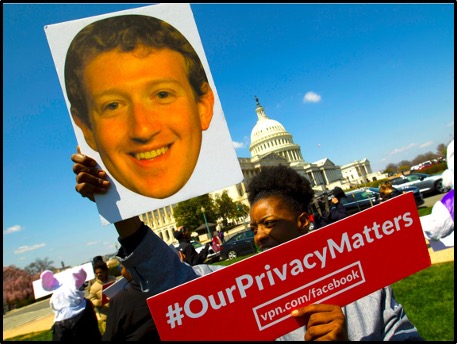The Greedy Algorithm: An investigation into Facebook’s mismanagement of Big Data
In 2018, Facebook was issued a lawsuit by the developers of a now-defunct organisation called Six4Three. In this, they stated that Facebook had grossly mistreated access to users’ private data, while also collecting huge amounts of information on their network of family and friends. This article will analyse the details of Facebook’s lawsuit while critically evaluating what the future holds for the management of Big Data.

Figure 1: Business Insider – Protest against Facebook’s privacy policies
Introduction
In Danah and Crawford’s (2012) publication: “Critical questions for big data: Provocations for a cultural, technological, and scholarly phenomenon”, they outline the various concerns that have arisen with the emergence of Big Data. They argue that one of the concerns with the ubiquity of Big Data is the notion that anyone’s online data can be accessed no matter the context (Danah and Crawford 2012). Specifically, it is argued that just because an individual’s data is publicly available does not grant anyone permission to use that data for their own interests. Furthermore, there is a vast distinction between ‘being in public’ and ‘being public’ (Danah and Marwick 2011). Just because someone has a public profile does not mean people with access to it are automatically permitted to use and analyse that data. A company that has famously not adhered to this idea is Facebook, and this text will be delving into a particular instance where Facebook’s privacy policies came under scrutiny.
As is evidenced from Boyd and Crawford’s article in 2012, the concerns about the rise of Big Data have been established for almost a decade now. In order to challenge the concerns associated with Big Data, it is pertinent to first define what it is. Although scholars (Fuller 2019) have claimed it is a vague term, most definitions agree that Big Data is utilised to describe the way in which computers store and capture massive amounts of data (Fuller 2019). These massive amounts of data are then analysed to reveal certain trends and patterns about human behaviour. The digital footprint of an individual’s personal life can reveal “patterns of consumption, work, travel, communication, play, interactions with organisations, and their thoughts and interests” (Kitchin 2014, 167). Such data is stored and subsequently used by the organisations that you give your personal information over to. However, contrary to ordinary practices of data collection, such information is being exploited for economic purposes where data is now seen as a monetary asset (Wilbanks 2014).

Figure 2: The Guardian – CEO of Facebook Mark Zuckerberg testifying at a hearing about the protection of user data
Facebook Allegations
The specific hearing shown in the picture above (Figure 2) was caused by accusations from a former start-up called Six4Three, where they declared that Facebook CEO Mark Zuckerberg had exploited his power to access data from any user’s friends’ network (Cadwalladr and Graham-Harrison 2018). This court case, which occurred around March of 2018, also alleged that Facebook had used apps to gather information on the family and friends of user’s networks, even though some of them had not signed up to the social media platform. In doing so, they tracked all of their text messages, their locations, and accessed all the photos on their phones (Cadwalladr and Graham-Harrison 2018). This sort of mass surveillance conducted by digital platforms has been defined as “dataveillance” (Fuchs 2011). Dataveillance is the “systematic monitoring of people’s actions or communications through the application of information technology” (Clarke 1988, 500). The dataveillance performed by Facebook is a great example of how much power social media platforms acquire and the questionable ways in which they can abuse this power. The range of methods Facebook used to gather users’ information included tracking and reading users’ texts, accessing and recording users’ in-built microphones on their mobiles, tracking and monitoring usage of competitive apps on their phones, and finally tracking and monitoring users’ calls (Cadwalladr and Graham-Harrison, 2018).
Facebook’s main purpose for creating this fraudulent scheme was to earn even more money while forcing potential rivals out of business (Cadwalladr and Graham-Harrison, 2018). Six4Three alleged that Facebook was highly aware that their mass accumulation and collection of highly sensitive personal data tempted app developers to create platforms on their site (Cadwalladr and Graham-Harrison, 2018). This came with the promise of long-term access to personal information such as likes, birthdays, and friends lists. The lawsuit alleges that once these companies became too successful, Facebook would run them into the ground to axe any competition (Cadwalladr and Graham-Harrison, 2018). Over 40,000 companies were purportedly subject to fraud committed by Facebook, with Mark Zuckerberg personally deciding which companies to cut off.

Figure 3: Screenshot taken from a YouTube video
Comments like the one shown above (Figure 3) illustrate the privacy paradox that occurs when signing up to social media platforms like Facebook. On the one hand, these platforms allow you access to incredible features such as connecting and communicating with friends from all over the world. Yet, on the other hand, once you sign up to these sites, you are instantly tracked and monitored with every click you make, all for monetary purposes. On top of all of this, not only your personal information gets tracked, but your friends and families too.
The future of Big Data
Problems arising with the emergence of a digital surveillance economy are evident with Six4Three’s case study on Facebook’s improper treatment of private data. What perpetuates the issue around platform surveillance is the fact that social media conglomerates such as Facebook are utilising this data to track and monitor consumers for commercial endeavours. With all the issues surrounding Facebook’s turbulent privacy concerns, it is particularly relevant to pose the question as to where the accumulation of big data is heading. It is clear that currently there is an unprecedented number of ways in which to collect online data and the use of such data is already having profound implications on society as a whole (Boyd and Crawford 2012). Big data has become an extension of who we are as humans, and it is constantly shaping the world as we see it and how it will become in the future. It is therefore important to challenge and question the concerns that are associated with the mass collection of private data. It can be argued that since Boyd and Crawford’s publication in 2012, the issues surrounding big data have become even more widespread than before, with Facebook’s lawsuit being a prime example. Increased accountability and awareness of the ethical considerations surrounding big data may be a way of decreasing the number of privacy issues associated with the aggregation of massive amounts of online data. Until this happens, we must keep challenging and interrogating the process of this new wave of data management.
Reference List
Boyd, Danah, and Kate Crawford. “Critical questions for big data: Provocations for a cultural, technological, and scholarly phenomenon.” Information, communication & society 15(5) (2012): 662-679.
Boyd, Danah, and Marwick, Alice E. “Social privacy in networked publics: Teens’ attitudes, practices, and strategies.” A decade in internet time: Symposium on the dynamics of the internet and society. (2011): 1-29.
Cadwalladr, Carole, and Graham-Harrison, Emma. (2018) ‘Facebook accused of conducting mass surveillance through its apps’, The Guardian,24 May. Available at: https://www.theguardian.com/technology/2018/may/24/facebook-accused-of-conducting-mass-surveillance-through-its-apps (Accessed: 29 September 2021).
Cadwalladr, Carole, and Graham-Harrison, Emma. (2018) ‘Zuckerberg set up fraudulent scheme to ‘weaponise’ data, court case alleges’, The Guardian, 24 May. Available at: https://www.theguardian.com/technology/2018/may/24/mark-zuckerberg-set-up-fraudulent-scheme-weaponise-data-facebook-court-case-alleges (Accessed: 29 September 2021).
Clarke, Roger. “Information technology and dataveillance.” Communications of the ACM 31(5) (1988): 498-512.
Fuchs, Christian. “Web 2.0, prosumption, and surveillance.” Surveillance & Society 8(3) (2011): 288-309.
Fuller, Michael. “Big data and the Facebook scandal: Issues and responses.” Theology 122(1) (2019): 14-21.
Kitchin, Rob. The data revolution: Big data, open data, data infrastructures and their consequences. Sage, 2014.
Wilbanks, John. “Portable approaches to informed consent and open data.” Privacy, Big Data, and the Public Good: Frameworks for Engagement 1 (2014): 234-252.